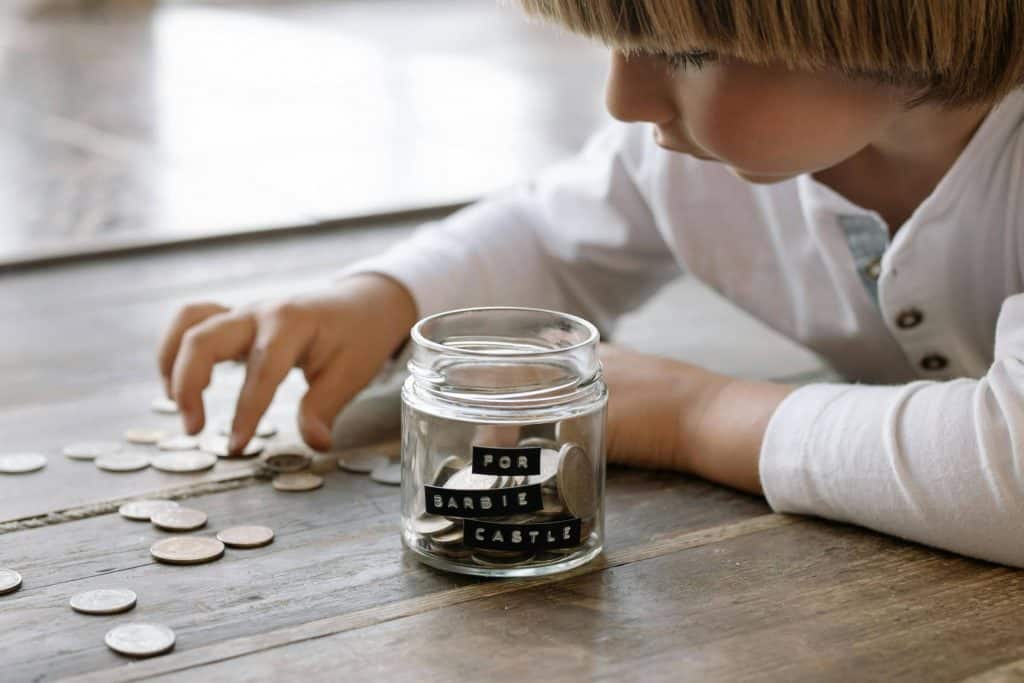Building Money Skills Early: A Guide For Toddlers to Teens
In order to set your children up for future financial success, it’s important to teach them the value of money and how to make financial decisions from a young age. Building money skills early on will give your child a head start for the future. These crucial life skills aren’t usually taught in school so it’s up to you to provide a financial education.
But when is the best time to start? Well if you haven’t started yet, the best time is now. This guide provides practical tips and age-appropriate educational activities for toddlers all the way up to teens.
Toddlers (Ages 1-3)
At this early age, children learn by exploring their environment and using their senses. They are starting to understand that objects exist even when out of sight (object permanence). They are also developing simple problem-solving skills such as sorting or fitting shapes into matching holes.

Simple Counting and Sorting Activities
Work on counting and sorting with your toddler using everyday objects and toys. When they are past the stage of putting everything in their mouth, you can practice doing this with coins (be sure to wash them first).
Play Money Games
Play “store” using a toy cash register and pretend money. Let them “buy” and “sell” toys or snacks. This is a fun way to start learning the concept of money.
Use a Piggy Bank
Give your child a piggy bank for them to start saving coins. I recommend using something clear so they are able to see their money adding up. Have them practice dropping coins in through the slot and talk to them about what money is for.
Preschoolers (Ages 3-5)
At this stage in development, children are developing problem-solving and creativity through role-playing and fantasy games. They are also starting to understand simple concepts like colors, shapes, numbers, and letters.

Use Multiple Piggy Banks or Money Jars
Introduce 3 separate piggy banks or jars for saving, spending, and sharing. Each time they get money, help them divide it between the jars based on their goals or values. This is a really effective way to start building money skills early.
Some examples of values a young kid might have include family, friendship, fairness, honesty, kindness, curiosity, creativity, independence, respect, and fun.
Shopping Role Play
Set up a pretend store using real or play items. Price the items and give your child a certain amount of pretend money. Let them shop in the grocery store making decisions on how to spend their money.
Read Children’s Books That Talk About Money
Continue to expose your child to the basic concepts by reading a variety of children’s books which cover the topic.
Early Elementary (Ages 6-8)
Children’s problem-solving abilities continue to improve. They are now able to apply logic to everyday situations and concrete events.

Teach Your Child to Set Short-term Savings Goals
Help your kid set a concrete, short-term savings goal for something they want. Print out a savings tracker to hang on the wall so they can easily see their progress. This is an easy way to introduce your child to the concept of delayed gratification.
Start an Allowance System
Introduce allowances tied to simple chores or tasks. Continue with the 3 money jar system (spending, savings, and sharing) and help the allocate their allowance to each category.
Play Financial Literacy Games
Play educational board games like Monopoly Jr. or online money games that teach basic money concepts. These games are great for building money skills early.
Middle to Late Elementary (Ages 9-12)
Young kids between these ages are beginning to develop abstract and thinking skills and understand complex concepts such as time and money. Their strategic thinking skills are also developing which further enhances their problem-solving and critical thinking abilities.

Personal Budgeting
This is a good time to introduce concepts such as balancing a budget and tracking expenses. Teach them to create a simple budget for their allowance or money earned from chores. Have them use budgeting and tracking worksheets. You can do them on paper or use a budgeting app specifically designed for kids. There are plenty out there so try a few to see which one works best for your kid (check out The 5 Best Budgeting Apps for Kids in 2024 for some ideas).
Entrepreneurship Projects
Encourage them to start a small business, like a lemonade stand or a craft sale. This will help them learn more about earning money, pricing items, and managing their money.
Introduce Medium-term Savings Goals
In addition to the short-term savings goals they have already established, teach them how to set a medium-term financial goals. Help them come up with a plan on how they will achieve their goal and a method for tracking.
Teenagers (Ages 13-17)
Abstract and critical thinking skills continue to develop throughout your child’s teen years. High school students are more capable of setting goals and making plans for the future. This is the best time to begin setting long-term goals and introduce more complex financial concepts.

Advanced Budgeting
Teach them to create a more detailed budget, including expenses for things like school supplies, personal items, and entertainment.
Financial Independence Projects
Encourage a part-time job so your child can gain practical experience earning and managing their own money. This will not only strengthen their money management skills, but will help develop a strong work ethic.
Introduction to Investing
Provide basic education on the stock market and important investing concepts such as compound interest. Consider setting up a small investment account with parental oversight so your teen is able to make actual investment decisions with real money. If your child is working and has a W2, you can set up a custodial Roth IRA for them. Be sure to emphasize the importance of long-term savings and how their savings will grow exponentially over time.
There are multiple money management apps teens can use to invest (with parental oversight) and track their finances. Check out a few of my favorite here.
Real-life Financial Skills
Discuss and practice other real-life financial skills, such as managing a checking or savings account and preparing for taxes. Teach them about student loans and how credit cards work. These are essential life skills that aren’t usually taught in school.
Conclusion
I hope this article has given you a lot of new ideas you can use to confidently teach your children about money, no matter what your financial situation is. Remember that this is a basic framework based on the typical stages of development. Every child is different so your child might be ready for some of these activities sooner or later than average.
Building money skills early is crucial. You cannot rely on anybody except for yourself to provide your child with the financial education they deserve. Developing a solid foundation and good financial habits at a young age will not only benefit your child well into adulthood, it will have a positive impact on the next generation and beyond.

